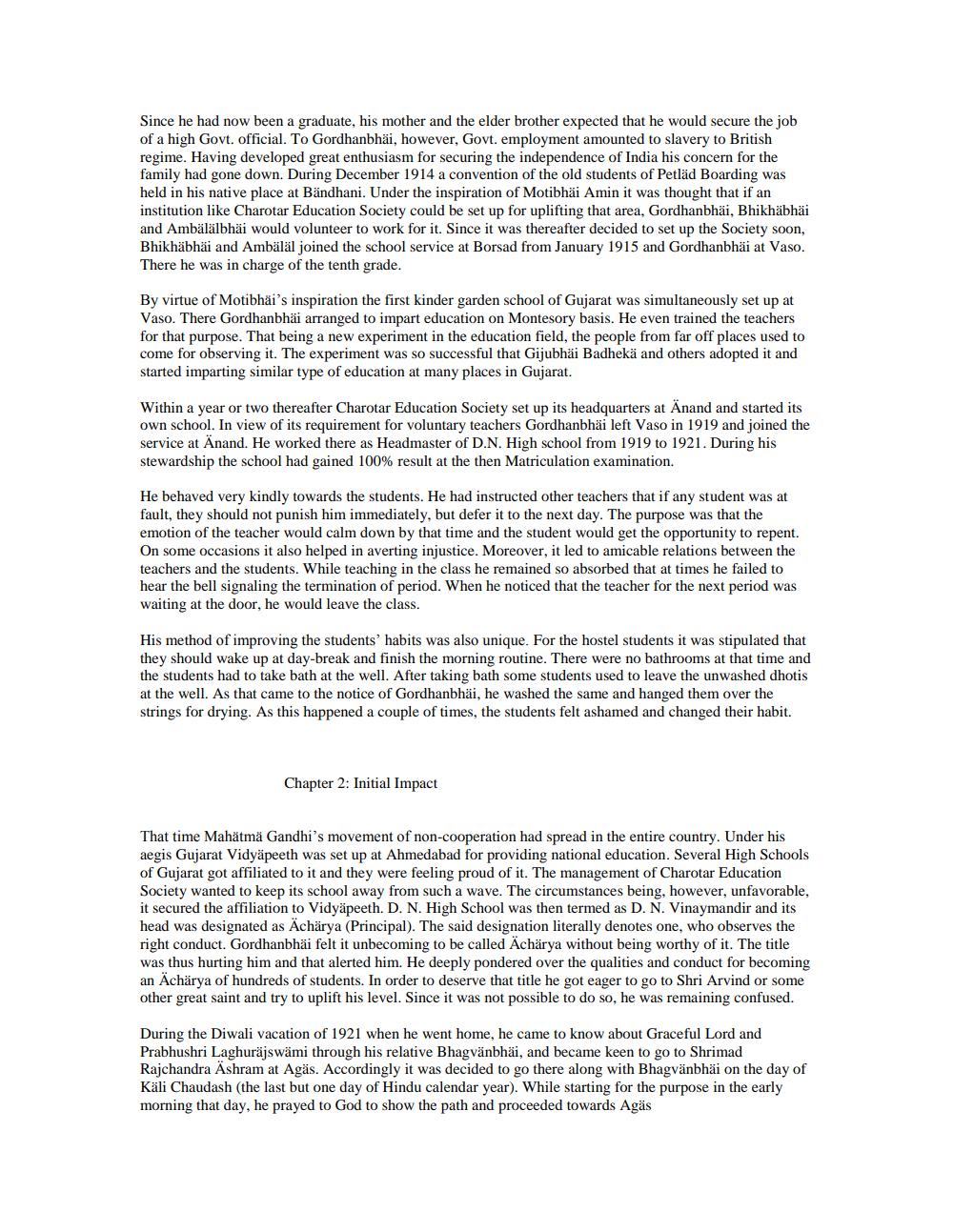Book Title: Brahmachariji Author(s): Manu Doshi Publisher: Manu Doshi View full book textPage 4
________________ Since he had now been a graduate, his mother and the elder brother expected that he would secure the job of a high Govt. official. To Gordhanbhäi, however, Govt. employment amounted to slavery to British regime. Having developed great enthusiasm for securing the independence of India his concern for the family had gone down. During December 1914 a convention of the old students of Petläd Boarding was held in his native place at Bändhani. Under the inspiration of Motibhai Amin it was thought that if an institution like Charotar Education Society could be set up for uplifting that area, Gordhanbhäi, Bhikhäbhäi and Ambälälbhäi would volunteer to work for it. Since it was thereafter decided to set up the Society soon, Bhikhäbhai and Ambäläl joined the school service at Borsad from January 1915 and Gordhanbhäi at Vaso. There he was in charge of the tenth grade. By virtue of Motibhäi's inspiration the first kinder garden school of Gujarat was simultaneously set up at Vaso. There Gordhanbhäi arranged to impart education on Montesory basis. He even trained the teachers for that purpose. That being a new experiment in the education field, the people from far off places used to come for observing it. The experiment was so successful that Gijubhai Badhekä and others adopted it and started imparting similar type of education at many places in Gujarat. Within a year or two thereafter Charotar Education Society set up its headquarters at Anand and started its own school. In view of its requirement for voluntary teachers Gordhanbhäi left Vaso in 1919 and joined the service at Anand. He worked there as Headmaster of D.N. High school from 1919 to 1921. During his stewardship the school had gained 100% result at the then Matriculation examination. He behaved very kindly towards the students. He had instructed other teachers that if any student was at fault, they should not punish him immediately, but defer it to the next day. The purpose was that the emotion of the teacher would calm down by that time and the student would get the opportunity to repent. On some occasions it also helped in averting injustice. Moreover, it led to amicable relations between the teachers and the students. While teaching in the class he remained so absorbed that at times he failed to hear the bell signaling the termination of period. When he noticed that the teacher for the next period was waiting at the door, he would leave the class. His method of improving the students' habits was also unique. For the hostel students it was stipulated that they should wake up at day-break and finish the morning routine. There were no bathrooms at that time and the students had to take bath at the well. After taking bath some students used to leave the unwashed dhotis at the well. As that came to the notice of Gordhanbhäi, he washed the same and hanged them over the strings for drying. As this happened a couple of times, the students felt ashamed and changed their habit. Chapter 2: Initial Impact That time Mahatma Gandhi's movement of non-cooperation had spread in the entire country. Under his aegis Gujarat Vidyapeeth was set up at Ahmedabad for providing national education. Several High Schools of Gujarat got affiliated to it and they were feeling proud of it. The management of Charotar Education Society wanted to keep its school away from such a wave. The circumstances being, however, unfavorable, it secured the affiliation to Vidyapeeth. D. N. High School was then termed as D. N. Vinaymandir and its head was designated as Achärya (Principal). The said designation literally denotes one, who observes the right conduct. Gordhanbhäi felt it unbecoming to be called Achärya without being worthy of it. The title was thus hurting him and that alerted him. He deeply pondered over the qualities and conduct for becoming an Achärya of hundreds of students. In order to deserve that title he got eager to go to Shri Arvind or some other great saint and try to uplift his level. Since it was not possible to do so, he was remaining confused. During the Diwali vacation of 1921 when he went home, he came to know about Graceful Lord and Prabhushri Laghuräjswämi through his relative Bhagvänbhäi, and became keen to go to Shrimad Rajchandra Ashram at Agäs. Accordingly it was decided to go there along with Bhagvänbhäi on the day of Käli Chaudash (the last but one day of Hindu calendar year). While starting for the purpose in the early morning that day, he prayed to God to show the path and proceeded towards AgäsPage Navigation
1 2 3 4 5 6 7 8 9 10 11 12 13 14 15 16 17 18 19 20 21 22
